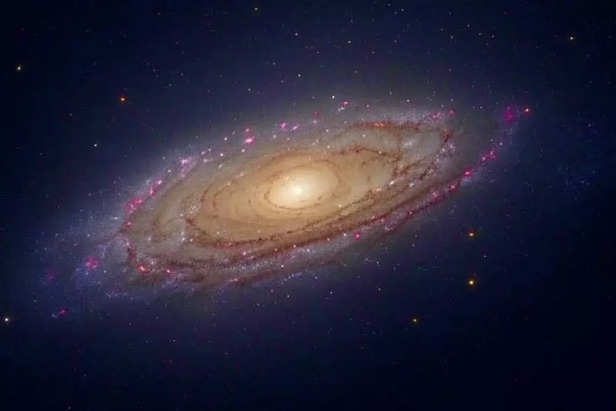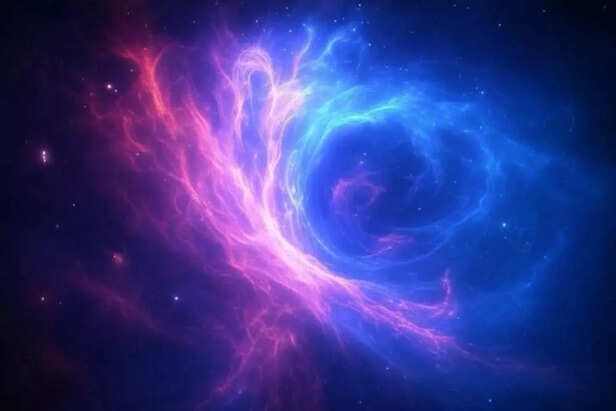Hail Cosmos: The New God Invented by Man
Yuvraj Nanda | Mar 08, 2025, 11:57 IST
( Image credit : Timeslife )
As humanity moves away from traditional religion, a new deity emerges—one that doesn’t judge, demand obedience, or require prayer. The cosmos itself has become the new god, wrapped in science and aesthetics. This article explores how the universe has replaced traditional faith, offering modern humans a sense of wonder, purpose, and even spiritual fulfillment—without the need for religion.
For thousands of years, humans have bowed before divine figures—gods with names, faces, and commandments. But in an age of science, skepticism, and what we may now call as aesthetic spirituality based on modern standards, something fascinating has happened: we have successfully created what we create the best—a new God, one that aligns with modern intellectual and artistic sensibilities. This god, unlike the rest, has no personality, no wrath, and no need for temples—yet it seeks to inspire a level of awe that rivals the old deities.
Its name? The Cosmos.

The new-age influencers and spiritualists have become successful in making a large section of the society believe that the universe, the galaxy, the stars and the planets hold authority over each distinct human life on Earth. The Cosmos has become the ultimate divine entity, discussed in podcasts, gazed at through telescopes, and admired in poetic Instagram captions. It is the perfect god for the modern human race—vast, mysterious, and conveniently non-judgmental.
Religious structures at one point dominated the whole of human civilization. From the pyramids of Egypt to the grand cathedrals, humanity built monuments for the divine. But in the 21st century, the focus seems to be shifted a little. We now discuss meditation, spirituality, and talk about the oneness of the soul and how it might be connected with a divine force. In order to align with the fresh evolution in the idea of praying and worshipping, the Cosmos has been provided with an all new idea of divinity.
For many, the images from the James Webb Space Telescope might be as inspiring as religious scriptures are for the traditionalists . The more they learn about black holes, supernovae, and parallel universes, the more they are drawn to the sacred mysteries of space. While scientists speak of the universe in almost theoretical tones, spiritualists seek divine wisdom for themselves from the very same source.
Unlike the traditional deities worshipped by traditional religions, the social positioning of the Cosmos is such that it does not demand obedience, prescribed morality, or worship. It might as well not punish sins, promise rewards, or dictate how humans should live. Instead, it is believed to offer an unfiltered reality but with a twist of occasional interference, as spoken about by those holding faith in the universe that it guides and decides the path on which every individual has to walk on.
This is why the cosmos is a modern god with an equally poor evidence for existing. It appeals to those who reject religious dogma but still crave awe, mystery, and existential purpose. The vastness of the universe reminds them of their insignificance (or not), yet it also fuels their deepest curiosity and leads to them building an individual connection with the eternity. They may not kneel in prayer, but might stare into the night sky with the same longing—searching for meaning, for connection, and something beyond themselves.
In many ways, we have taken the aesthetic and emotional elements of religion and repackaged them in a form that feels more intellectually sophisticated. We don’t pray to the cosmos, but we quote the idea of universal intervention in each distinct life like a scripture. The spiritualists may or may not fear divine punishment, but they speak of cosmic karma, energy, and the universe “aligning things”—a modern twist on fate and destiny.
While it is not science because the evidence of the universe having a personality has no credible evidence—it is still a vibe or a feeling to which some spiritualists connect. The cosmos is no longer just an astronomical phenomenon; it has become an aesthetic, a philosophy, a brand, or if one may call it, another theory justifying the idea of destiny. From space-themed music to association with religions like Hinduism and Buddhism which talk of the soul, the believers of Cosmos have successfully evolved from social media captions about the stars to entire subcultures that now embrace the universe as a source of existential divinity. This has turned the cosmos into something more than what it was perceived as.

There’s something deeply human about this. Even as we drift away from religious institutions, we still seek beauty, transcendence, and a connection to something bigger. The universe provides all that, without commandments or controversies. It is vast, unknowable, and deeply moving—exactly what a god should be.
So, has humanity truly replaced God with the cosmos? Maybe not entirely, but the signs are clear—we crave wonder, we seek meaning, and we worship concepts that are more appealing by the modern standards, even if we no longer call it religion.
The cosmos may not be an actual deity, but in the minds of people, it functions like one. It reminds them of their insignificance yet fills them with awe and purpose, whether real or not is a different story. It is the perfect god for the doubtful yet sentimental, the practical yet spiritual, the modern human searching for something greater—without losing much of intellectual credibility.
Hail Cosmos.
Its name? The Cosmos.

The Cosmos, generated by AI
( Image credit : Timeslife )
The new-age influencers and spiritualists have become successful in making a large section of the society believe that the universe, the galaxy, the stars and the planets hold authority over each distinct human life on Earth. The Cosmos has become the ultimate divine entity, discussed in podcasts, gazed at through telescopes, and admired in poetic Instagram captions. It is the perfect god for the modern human race—vast, mysterious, and conveniently non-judgmental.
The Shift in How Humans Worship
For many, the images from the James Webb Space Telescope might be as inspiring as religious scriptures are for the traditionalists . The more they learn about black holes, supernovae, and parallel universes, the more they are drawn to the sacred mysteries of space. While scientists speak of the universe in almost theoretical tones, spiritualists seek divine wisdom for themselves from the very same source.
A God Without Rules?
This is why the cosmos is a modern god with an equally poor evidence for existing. It appeals to those who reject religious dogma but still crave awe, mystery, and existential purpose. The vastness of the universe reminds them of their insignificance (or not), yet it also fuels their deepest curiosity and leads to them building an individual connection with the eternity. They may not kneel in prayer, but might stare into the night sky with the same longing—searching for meaning, for connection, and something beyond themselves.
In many ways, we have taken the aesthetic and emotional elements of religion and repackaged them in a form that feels more intellectually sophisticated. We don’t pray to the cosmos, but we quote the idea of universal intervention in each distinct life like a scripture. The spiritualists may or may not fear divine punishment, but they speak of cosmic karma, energy, and the universe “aligning things”—a modern twist on fate and destiny.
The Effort to Make Spirituality Scientific

A depiction of the Universe, generated by AI.
( Image credit : Timeslife )
There’s something deeply human about this. Even as we drift away from religious institutions, we still seek beauty, transcendence, and a connection to something bigger. The universe provides all that, without commandments or controversies. It is vast, unknowable, and deeply moving—exactly what a god should be.
Conclusion: A God for the Modern Age?
The cosmos may not be an actual deity, but in the minds of people, it functions like one. It reminds them of their insignificance yet fills them with awe and purpose, whether real or not is a different story. It is the perfect god for the doubtful yet sentimental, the practical yet spiritual, the modern human searching for something greater—without losing much of intellectual credibility.
Hail Cosmos.
